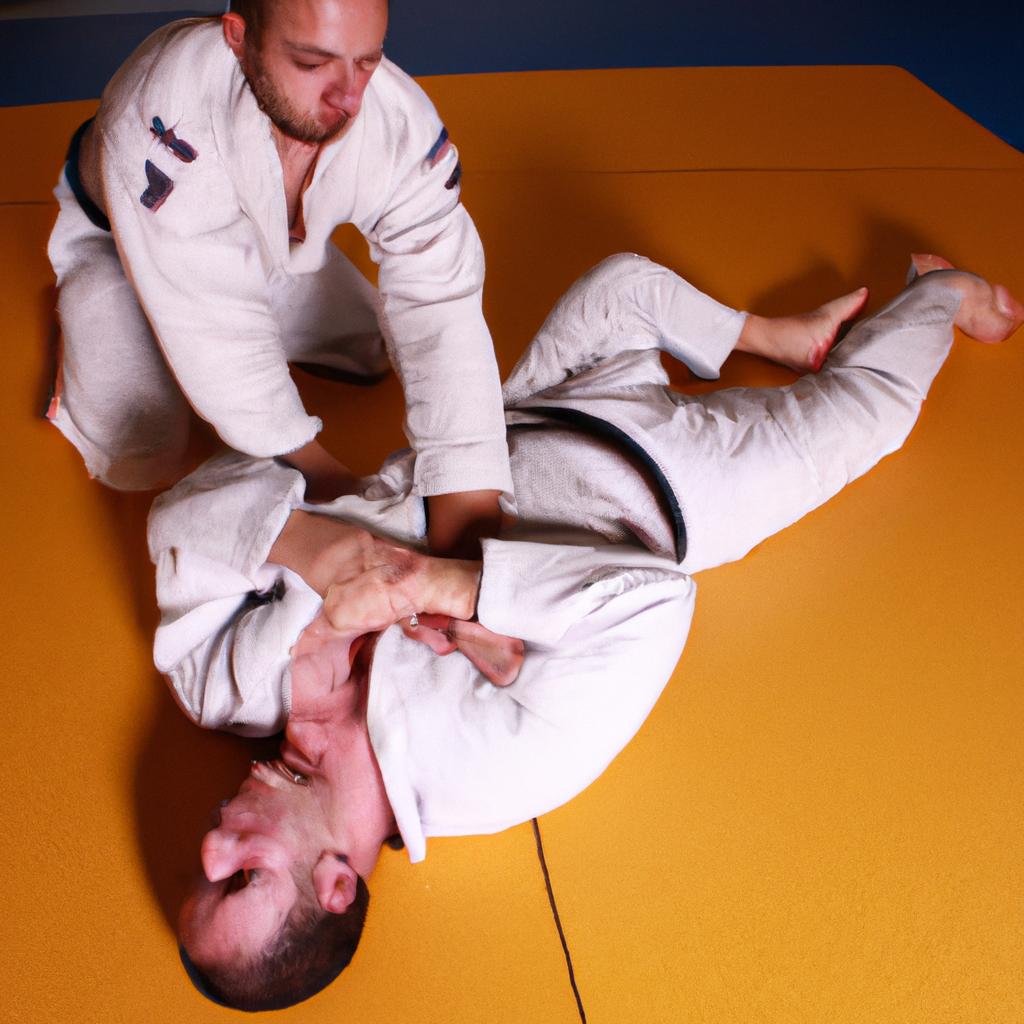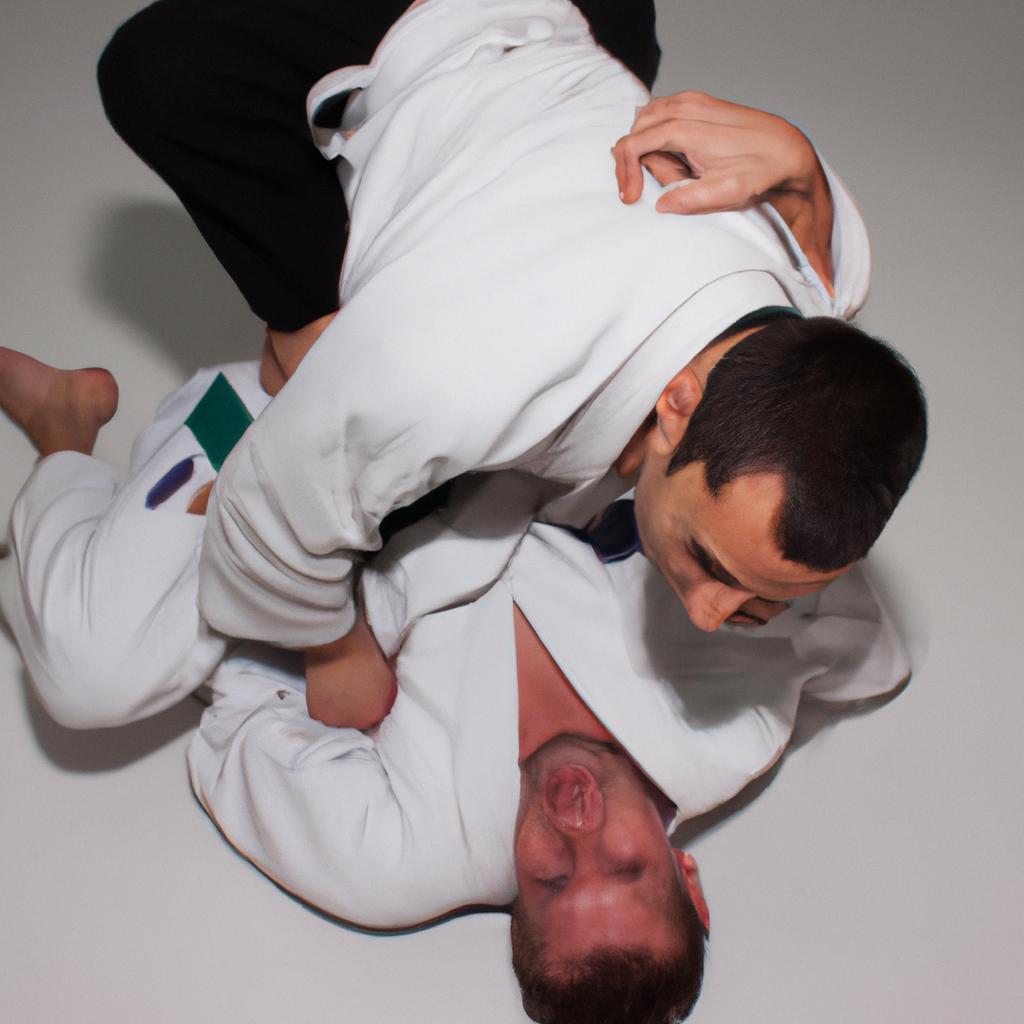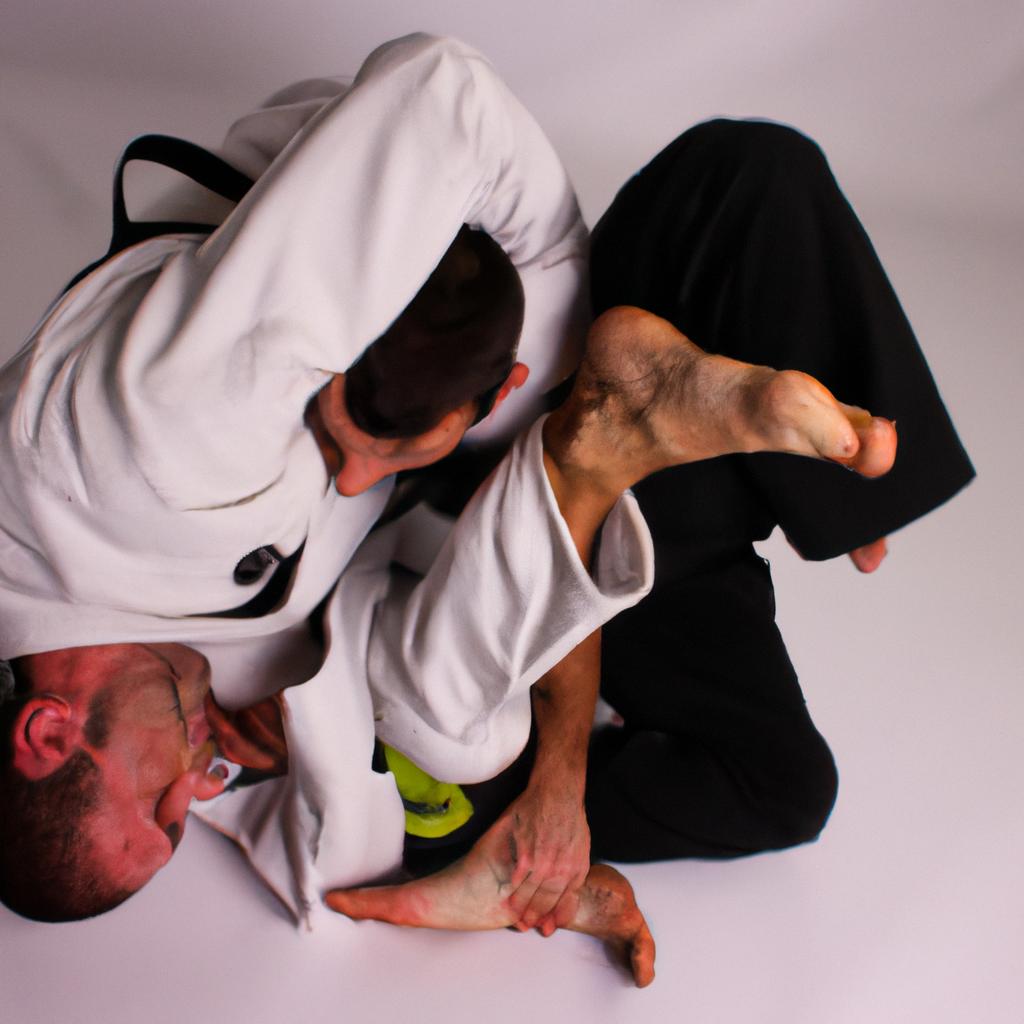Tournaments serve as a platform for athletes from various martial arts disciplines to showcase their skills, determination, and sportsmanship. Among these combat sports is Brazilian Jiu-Jitsu (BJJ), known for its emphasis on technique and leverage rather than relying solely on physical strength. This article explores the world of BJJ tournaments, examining the rules and regulations that govern them, the strategies employed by competitors, and the significance of these events in advancing the sport.
To illustrate the impact of BJJ tournaments, consider the hypothetical case study of John, an aspiring MMA fighter. After years of training in multiple martial arts styles, John decides to focus his efforts on mastering Brazilian Jiu-Jitsu due to its effectiveness in ground fighting scenarios. He enters his first tournament with a mix of excitement and nervousness, knowing that this event will test not only his technical prowess but also his mental resilience under pressure. As John steps onto the mat surrounded by fellow competitors who share his passion for BJJ, he becomes part of a community united by their dedication to honing their craft through competition.
In order to fully comprehend the intricacies of BJJ tournaments, it is essential to delve into their structure and organization. These events are typically divided into weight classes to ensure fair matchups between competitors of similar size and strength. This allows for a level playing field, as it prevents individuals with significant weight advantages from overpowering their opponents.
Within each weight class, competitors are further categorized based on belt rank. Brazilian Jiu-Jitsu utilizes a belt system to signify an individual’s skill level, starting with white belt (beginner) and progressing through blue, purple, brown, and black belts (advanced). By dividing competitors into different belt ranks within their weight class, BJJ tournaments ensure that athletes face off against opponents of comparable experience and expertise.
The rules and regulations of BJJ tournaments also play a crucial role in shaping the dynamics of the matches. Matches typically take place on a mat, where two competitors engage in grappling techniques aiming to gain dominant positions or secure submissions such as chokes or joint locks. Points are awarded for various actions during the match, including takedowns, sweeps (reversals), positional control, and submission attempts. These points determine the winner if there is no submission before time expires.
Additionally, BJJ tournaments have specific rules regarding allowable techniques and prohibited moves to maintain safety and fairness. For example, certain leg locks may be restricted at lower belt levels due to the potential risk of injury. Referees closely monitor matches to enforce these rules and ensure fair play.
Strategies employed by competitors can vary depending on their style and individual strengths. Some athletes may focus on utilizing their technical skills to outmaneuver opponents and secure advantageous positions or submissions. Others may rely more heavily on physical attributes such as strength or speed.
Participating in BJJ tournaments holds great significance for both individual practitioners like John and the sport as a whole. For individuals like John, tournaments provide an opportunity to put their training into practice against challenging opponents from different gyms or regions. It offers a chance for self-improvement by identifying areas for growth and learning from both victories and defeats.
On a broader scale, BJJ tournaments contribute to the evolution and advancement of the sport. Athletes showcase new techniques and strategies, inspiring innovation among practitioners worldwide. Tournaments also foster camaraderie among participants, creating a sense of community and shared passion for Brazilian Jiu-Jitsu.
In conclusion, BJJ tournaments serve as a platform for athletes to demonstrate their skills and sportsmanship while competing against opponents of similar size and skill level. These events are structured with weight classes and belt ranks to ensure fair matchups. Rules and regulations govern the matches, emphasizing technique over physical strength. By participating in tournaments, individuals like John can test their abilities, learn from their experiences, and contribute to the growth of Brazilian Jiu-Jitsu as a sport.
What is Brazilian Jiu-Jitsu?
What is Brazilian Jiu-Jitsu?
Imagine a scenario where two opponents are engaged in an intense grappling match. They maneuver and strategize, utilizing their strength, technique, and mental acuity to gain the upper hand. Suddenly, one competitor expertly executes a submission hold that forces the other to tap out, conceding defeat. This captivating display of skill and dominance can be witnessed in the world of Brazilian Jiu-Jitsu (BJJ).
Brazilian Jiu-Jitsu is a martial art that focuses on ground fighting techniques and submissions. It originated from Japanese Jujutsu and was further developed by the Gracie family in Brazil during the early 20th century. In BJJ, practitioners aim to control their opponent through various holds, locks, chokes, and joint manipulations rather than relying solely on strikes or kicks.
To better understand what makes Brazilian Jiu-Jitsu unique, let’s explore some key aspects:
- Technical Precision: BJJ prioritizes precise execution of techniques over raw physical strength. Practitioners learn how to leverage body mechanics efficiently to overcome larger opponents.
- Mental Resilience: The practice of BJJ demands mental toughness as individuals must remain calm under pressure while strategizing their moves amidst constant resistance.
- Inclusivity: Unlike many combat sports where size and athleticism play significant roles, BJJ emphasizes inclusivity by allowing practitioners of all ages, genders, shapes, and sizes to compete against each other.
- Emphasis on Ground Fighting: Unlike striking-based martial arts like boxing or kickboxing which focus primarily on standing exchanges, BJJ places heavy emphasis on ground fighting scenarios where fighters engage while kneeling or lying down.
Moreover, understanding the historical context behind this intriguing discipline helps shed light on its significance within today’s martial arts landscape. So without further ado, let us delve into the rich history of Brazilian Jiu-Jitsu.
Continuing with the next section, we explore “The History of Brazilian Jiu-Jitsu”…
The History of Brazilian Jiu-Jitsu
Tournaments: MMA Martial Arts: Brazilian Jiu-Jitsu
What is Brazilian Jiu-Jitsu?
In the previous section, we explored the fundamental aspects of Brazilian Jiu-Jitsu (BJJ) and its origins. Now, let’s delve deeper into the world of BJJ tournaments and how they showcase the skills and techniques of this martial art.
To illustrate the intensity and competitive nature of BJJ tournaments, consider a hypothetical scenario where two highly skilled practitioners meet in the final match of a major tournament. The tension is palpable as both competitors step onto the mat, showcasing their mastery of submissions and ground grappling techniques. With precision and agility, they execute fluid transitions from guard to mount positions while relentlessly seeking opportunities for submission holds. This example highlights the dynamic nature of BJJ competitions that captivate enthusiasts worldwide.
To better understand these tournaments, here are some key points:
- Rules: BJJ tournaments adhere to specific rules governing various aspects such as scoring, time limits, weight divisions, prohibited techniques, and safety protocols.
- Weight Divisions: Competitors are categorized based on weight classes to ensure fair matches between individuals with similar body compositions.
- Belts: Like many traditional martial arts disciplines, BJJ employs a belt system to signify an individual’s skill level and experience. In most tournaments, participants are grouped according to their belts.
- Different Formats: Tournaments can have different formats depending on factors like location, organization type (e.g., International Brazilian Jiu-Jitsu Federation), or even special events that incorporate other combat sports elements like mixed martial arts (MMA).
| Tournament Benefits | Emotional Response |
|---|---|
| Opportunities for growth | Excitement |
| Community building | Camaraderie |
| Personal achievement | Pride |
| Mental toughness development | Determination |
With its rich history steeped in tradition and practicality, Brazilian Jiu-Jitsu has evolved into a highly respected martial art worldwide. In the subsequent section, we will explore how Brazilian Jiu-Jitsu differs from other martial arts, shedding light on its unique characteristics and advantages.
How Brazilian Jiu-Jitsu Differs from Other Martial Arts
The Evolution of Brazilian Jiu-Jitsu Competitions
As the popularity of Brazilian Jiu-Jitsu (BJJ) grew, so did the demand for competitive platforms to showcase its effectiveness. Today, BJJ tournaments provide a crucial avenue for practitioners to test their skills against opponents from various backgrounds and skill levels. These competitions not only serve as a means of personal growth but also contribute significantly to the evolution and refinement of this martial art.
To better understand the significance of BJJ tournaments, consider a hypothetical scenario where two individuals with different training backgrounds engage in a match. One fighter has primarily trained in striking-based disciplines such as boxing or kickboxing, while the other specializes in ground-based grappling arts like BJJ. In this encounter, both participants bring their unique strengths and strategies into play, exemplifying how tournaments act as catalysts for cross-disciplinary combat encounters.
Emotional Response – Bullet Point List:
Participating in BJJ tournaments can evoke various emotions among competitors and spectators alike. Here are some common sentiments often associated with these events:
- Excitement: Witnessing skilled athletes demonstrate technical prowess generates an adrenaline-fueled environment.
- Nervousness: Competitors experience heightened anxiety before stepping onto the mat due to the pressure to perform well.
- Camaraderie: Despite being individual pursuits, BJJ tournaments foster a sense of community among participants who share similar passions.
- Determination: Athletes push themselves physically and mentally during matches, showcasing unwavering resolve.
Emotional Response – Table:
| Emotion | Description |
|---|---|
| Excitement | Heart-pounding moments that captivate audiences |
| Nervousness | Anxiety-inducing anticipation before each bout |
| Camaraderie | The feeling of unity among fellow practitioners |
| Determination | Unyielding perseverance displayed by athletes during competition |
The Impact of BJJ Tournaments on the Martial Art
BJJ tournaments play a vital role in shaping and improving the martial art itself. Through these competitions, practitioners have the opportunity to refine their techniques, develop new strategies, and adapt to various fighting styles. This constant evolution contributes to the growth and innovation within Brazilian Jiu-Jitsu.
Moreover, BJJ tournaments provide a platform for athletes to gain recognition and build reputations as skilled competitors. Success in these events can lead to sponsorship opportunities, professional contracts, or even invitations to high-level training camps. As such, tournaments serve not only as testing grounds but also as stepping stones toward further advancement within the world of Brazilian Jiu-Jitsu.
In conclusion, BJJ tournaments offer an invaluable avenue for personal growth and skill development while simultaneously refining and advancing the martial art of Brazilian Jiu-Jitsu. By fostering cross-disciplinary encounters and providing platforms for recognition, these competitions contribute significantly to both individual practitioners’ journeys and the larger community’s progression.
Transition into subsequent section: Now that we understand the importance of tournaments in Brazilian Jiu-Jitsu, let us explore how these events shape its landscape through enhanced competitiveness and technical refinement.
The Importance of Tournaments in Brazilian Jiu-Jitsu
Tournaments play a crucial role in the world of Brazilian Jiu-Jitsu, providing practitioners with an opportunity to test their skills and showcase their progress. One notable example is the prestigious International Brazilian Jiu-Jitsu Federation (IBJJF) World Championships, which gathers top athletes from around the globe to compete for the title. By participating in tournaments, practitioners can gain valuable experience, learn from their matches, and measure their abilities against others in a controlled environment.
Tournaments offer several benefits to those involved in Brazilian Jiu-Jitsu. Firstly, they provide a platform for competitors to challenge themselves physically and mentally. The intense pressure and adrenaline rush experienced during tournament matches can simulate real-life self-defense situations or encounters inside the ring. This exposure helps practitioners develop composure under stress and enhances their decision-making abilities. Secondly, tournaments foster camaraderie among participants by bringing together individuals who share a passion for this martial art form. Competitors have opportunities to connect with like-minded individuals, forge new friendships, and create lasting bonds within the community.
To further understand the significance of tournaments in Brazilian Jiu-Jitsu, consider these emotional responses that they evoke:
- Excitement: Tournaments generate excitement as spectators eagerly anticipate each match and marvel at the technical prowess on display.
- Nervousness: Participants may feel nervous before competing due to high stakes and expectations placed upon them.
- Determination: Athletes exhibit unwavering determination as they strive to achieve victory through hard work and dedication.
- Pride: Successful performances elicit feelings of pride not only in individual accomplishments but also in representing one’s academy or team.
Moreover, it is interesting to note some key aspects commonly found in Brazilian Jiu-Jitsu tournaments using the following table:
| Aspects | Description |
|---|---|
| Weight Divisions | Competitors are categorized based on their body weight |
| Belt Rankings | Matches are often organized based on belt levels |
| Scoring System | Points awarded for various positions and submissions |
| Time Limits | Matches typically have set durations to ensure fairness |
In summary, tournaments hold great significance in the world of Brazilian Jiu-Jitsu. They provide practitioners with opportunities to test their skills, gain valuable experience, and foster a sense of community within the martial arts discipline. The excitement, nervousness, determination, and pride associated with these events contribute to the overall growth and development of both individuals and the sport as a whole. Transitioning into the subsequent section about “Rules and Regulations of Brazilian Jiu-Jitsu Tournaments,” it is essential to understand how competitions are structured and governed in order to fully appreciate their role in this dynamic martial art form.
Rules and Regulations of Brazilian Jiu-Jitsu Tournaments
Tournaments in Brazilian Jiu-Jitsu provide a platform for practitioners to showcase their skills, test their abilities against opponents of varying levels, and gain valuable experience in a competitive setting. One such example is the annual World Championships organized by the International Brazilian Jiu-Jitsu Federation (IBJJF), where competitors from around the globe come together to compete for prestigious titles across different weight divisions.
Participating in tournaments offers numerous benefits to both novice and experienced practitioners alike. Firstly, it allows individuals to gauge their progress and identify areas that need improvement. By facing unfamiliar opponents with diverse styles, fighters are forced to adapt and strategize on the spot, honing their problem-solving skills under pressure. Secondly, tournaments foster a sense of community within the Brazilian Jiu-Jitsu world by bringing enthusiasts together who share a passion for the art form. This camaraderie not only strengthens bonds but also creates an environment conducive to learning and growth.
To further emphasize the significance of tournaments in Brazilian Jiu-Jitsu, consider these emotional responses:
- The exhilaration felt when stepping onto the mats, ready to face formidable adversaries.
- The nervous anticipation before each match as adrenaline courses through one’s veins.
- The pride that swells upon victory or even after giving one’s best effort despite falling short.
- The heartbreak experienced when defeat becomes a temporary setback on the path towards mastery.
Moreover, let us examine some key aspects that underline the importance of tournaments:
| Aspects | Importance |
|---|---|
| Skill Testing | Assessing proficiency levels |
| Development | Enhancing techniques and strategies |
| Networking | Building connections within the community |
| Recognition | Gaining exposure and acknowledgment for achievements |
In conclusion, participating in Brazilian Jiu-Jitsu tournaments serves as a catalyst for personal development while providing opportunities for skill assessment and recognition within the martial arts community. It fosters growth, camaraderie, and resilience in practitioners of all levels. In the subsequent section, we will delve into valuable tips to consider when competing in Brazilian Jiu-Jitsu tournaments, helping individuals maximize their potential on this competitive stage.
Tips for Competing in Brazilian Jiu-Jitsu Tournaments
In the previous section, we explored the rules and regulations that govern Brazilian Jiu-Jitsu tournaments. Now, let’s delve into some tips to enhance your performance in these competitions.
Imagine a scenario where you are preparing for an upcoming Brazilian Jiu-Jitsu tournament. You have trained rigorously, honed your techniques, and studied various strategies. As you step onto the mat, adrenaline surges through your veins. The crowd watches intently as you engage with your opponent in a fierce grappling match. This example highlights the intensity and excitement associated with participating in Brazilian Jiu-Jitsu tournaments.
To maximize your chances of success, consider the following tips:
- Mental Preparation: Prepare yourself mentally by visualizing different scenarios and outcomes during training sessions.
- Physical Conditioning: Engage in regular strength and conditioning exercises specific to Brazilian Jiu-Jitsu to improve stamina, flexibility, and overall physical fitness.
- Strategy Development: Analyze opponents’ strengths and weaknesses before matches to formulate effective game plans.
- Weight Management: Maintain optimal weight within your chosen weight class to compete at your best without compromising health or performance.
Additionally, understanding common mistakes made by competitors can help you avoid them. Take a look at the table below which outlines four common errors often observed during Brazilian Jiu-Jitsu tournaments:
| Common Mistakes | Impact on Performance |
|---|---|
| Poor time management | Leads to rushed decision-making |
| Lack of sportsmanship | Negatively affects reputation among peers |
| Failure to adapt to opponent’s strategy | Increases vulnerability during matches |
| Inadequate recovery between fights | Diminishes physical capabilities |
By acknowledging these pitfalls early on, you can make conscious efforts to mitigate their impact on your performance.
Embrace each tournament as an opportunity for growth – physically, mentally, and emotionally. Remember that success in Brazilian Jiu-Jitsu tournaments stems not only from technical proficiency but also from discipline, determination, and a passion for the art. So step onto that mat with confidence, execute your techniques flawlessly, and leave a lasting impression on both yourself and others.




